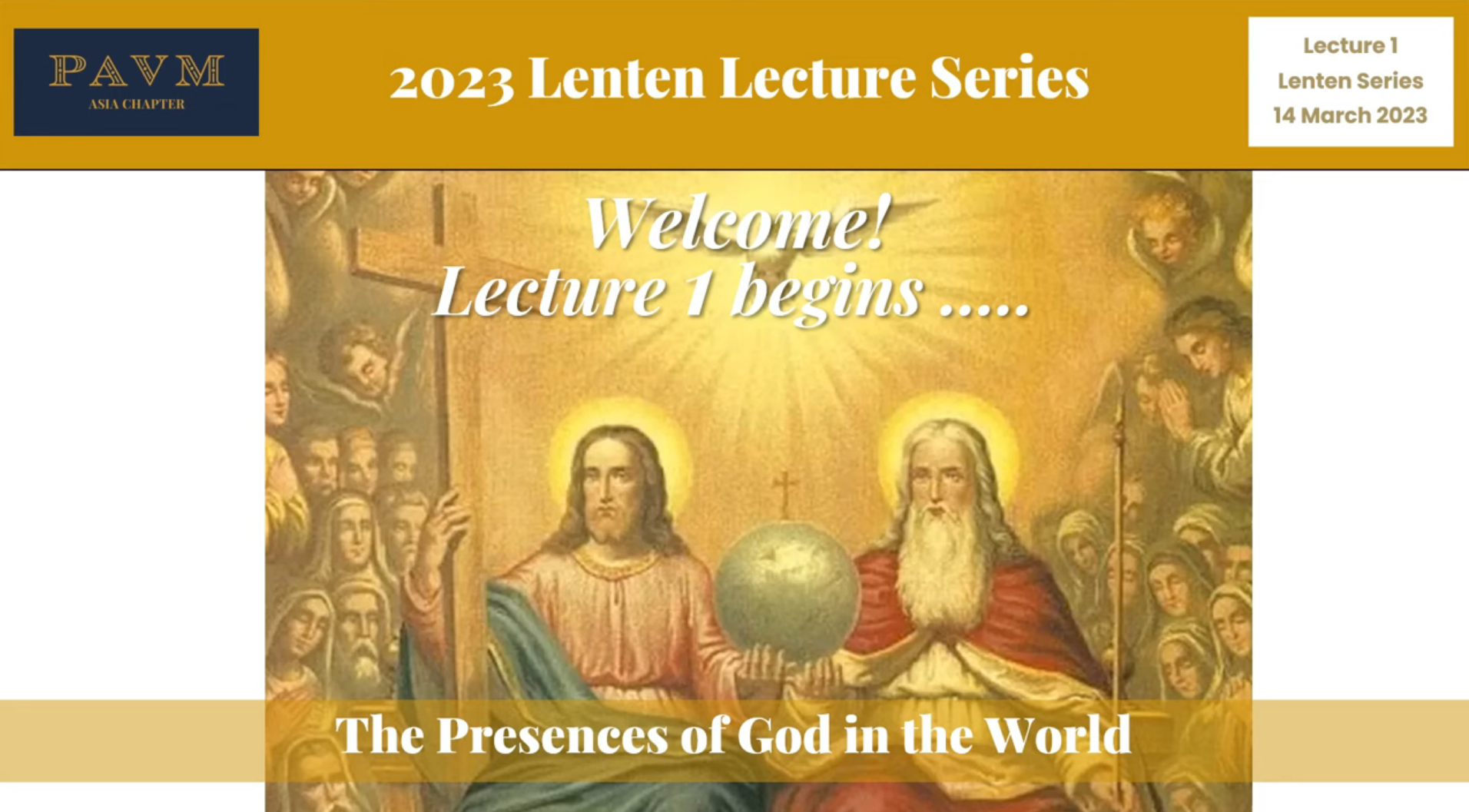The Presences of God in the World
APAVM SG • 340 views
By Fr. Simon Gaine, OP, Professor of Theology, Director, Angelicum Thomistic Institute. People are sometimes advised to begin their daily prayers by making an act of the presence of God. While God is not the same thing as the world, and God is not absent from the world, he is present in the world in different ways. The talk explains three main ways in which God is present among us. The first is the way that God is present to all that he has made as Creator, nearer to us that we are to ourselves. A second way he is present to us is as One that we know and love. This makes sense of the Christian teaching that God the Holy Trinity is present in the souls of the just in a special way known as the divine indwelling. Finally, Christians believe that God is present in a personal way in Jesus, who is God dwelling amongst us.
About Father Simon Gaine
Fr. Simon Gaine completed his doctoral studies at Oxford University on the topic of uncreated and created grace, and has served for many years as a Lector in Fundamental and Dogmatic Theology at Blackfriars, Oxford. He is the author of two monographs and his current research is concerned especially with topics of theological anthropology. In 2021, he was appointed by Pope Francis as a member of the International Theological Commission, to assist the Church’s Magisterium, and in particular the Dicastery for the Doctrine of Faith, through theological advice and the study of important theological issues.
Questions asked during Father Gaine’s lecture and his replies
Q. If God is so present to all that he has created, especially the human being, how do we explain why there are atheists and apostates? Can we assume they are suffering in some way in not acknowledging their Creator? (Margaret Soon)
A. While God is present in all people as their Creator, we can freely place an obstacle in the way of His presence as the object of knowledge and love, a presence which God does not compel us to accept. Different people have different reasons for putting an obstacle in the way of God’s second kind of presence. Perhaps they don’t find arguments for God’s existence convincing, or they are shocked at the behaviour of some Christians, or they are too proud of themselves. There can be many reasons. Of course they all suffer in some way, because it is only by knowing and loving God that human beings can be truly fulfilled, and none of the alternatives in which atheists and others look for fulfilment can bring the perfect happiness for which we hope by seeing God in heaven.
Q. What should we do to return to God clearly, through your lecture? (HunJin Cho)
A. Believe in Jesus Christ, hope in what he has promised us, and love God with all our hearts and our neighbours as ourselves, be baptized if we are not already baptized, and frequent the sacraments, repent of our sins, read the Bible, get to know the Catholic faith better, pray, be generous to others, lead virtuous lives
Q. Father, I do not know how to listen to God's voice. Is it his or is it mine? How to differentiate? (Cynthia Choo-Schmid)
A. Sometimes our own voice can be a way in which God speaks to us, just as God can speak to us through the voices of other people. But sometimes we can also try to deceive ourselves, just as others can deceive us. How can we discern if something comes from God or not? The better we get to know God through reading the Scriptures, the better we are able to know if something comes from God or not. For example, Christ tells us in Scripture, “Do not be afraid!” This helps us discern whether other things we hear are telling us the same as Christ (or at least compatible with what he tells us in Scripture) or something that contradicts what Christ tells us. Moreover, if we stay close to God by frequenting the sacraments, including regular confession of our sins, we are less likely to deceive ourselves through our own voice.
Q. How do I hear God talking to me? Eg, when I am in distress and I pour out my heart to Him, how do I hear His comfort and consolation? (Paul Chew)
A. His consolation comes to us first of all in the Word of God we find in the Scriptures. Reading some of the Psalms can be especially useful here. We should not expect to find some word in prayer apart from our attention to the Scriptures. What we read there can help us discern what God is saying to us elsewhere in our lives.
Q. Father, how can we show or explain our faith and the presence of God to people around us who are non-believers? (Alicia Gosari)
A. Partly through our actions in our everyday lives. If people see our good works, they can learn to give glory to God. To be able to explain our faith to them in a compelling way, we need to get to know our faith better. Our preaching can then pour forth from our own contemplation and study. I hope that listening to what I had to say about God’s presence will help you be able to explain God’s presence to people you meet who do not believe in Him. God can use your words to help them believe.
Q. How should one balance the demands of secular and spiritual life since we cannot serve 2 masters? (Lu-Ann Ong)
A. With prayer and common sense. For example, we cannot neglect our earthly duties by spending time in prayer. Making time sensibly for prayer, reading the Scriptures, frequenting the sacraments and so on, can help us fulfil our other duties. These other duties only become another master when we put them into first place, in God’s place, in our lives. When we attend to them as properly ordered to God the Supreme God in our lives, they are not a second master but help us serve God as we should.
Q. Do you think a loving and caring pet (a creature of God) go to heaven too? (Lawrence Chin)
A. I do not know what the full content of the new creation will be. God has not revealed to us whether or not there will be any animals other than ourselves in heaven, so we do not know. We have reason to think that human beings will be in heaven because we have immortal souls and God has promised to us the resurrection of the dead at the end of time. But we do not have the same reasons for thinking other animals can be in heaven partly because they do not manifest the same ordering to the infinite that humans, made in the image of God, do. We will certainly not need our pets to be perfectly happy because God alone will make us perfectly happy in heaven, but as God is the creator of our pets, our happiness in knowing God will include a more powerful knowledge of our former pets when we come to the next world than we have of them now.
Q. Fr. Simon, is God still present in souls who are in mortal sin? (Karen Lim)
A. Of course God is always present in His creatures as their Creator, and there remains some good even in a creature who rejects God, though not the good of his second kind of presence, that is, God’s presence as one known and loved by us by charity. God makes his home in us through the second kind of presence, and when we commit a mortal sin we throw God out of his own home.
Q. Father, in finding a spiritual director to help us to better our spiritual life, must it be of the same gender, or can it be of different gender? Thank you. (Sri Handayani Sutarno)
A. I think these questions always depend on the situation of the individual. There is no general rule for everyone.
Falling towards God: What the Saints Teach Us about Prayer
APAVM SG • 23 views
Fr Paul Murray, OP, Professor of Theology, Angelicum
One of the great images given to us by tradition and by the Catholic saints to describe progress in prayer is the ascent of a high mountain. But the image on which Fr Murray wishes to focus attention, and it’s an image also hallowed by tradition, is an image not of going up but of going down, an image of a humble descent, an image of falling. Progress viewed in this perspective can be thought of taking place in three stages: first, falling into Sin; second, falling towards Grace; and, third, falling in Love with God.
About Father Fr. Paul Murray.
Fr. Murray teaches spiritual theology at the Pontifical University of St. Thomas Aquinas in Rome. He made profession as a friar of the Order of Preachers (often called the “Dominicans”) in 1967 and was ordained a priest in 1973. Fr. Murray holds a Doctorate in English Literature from University College, Dublin. He received the rare distinction of being named Master in Sacred Theology in 2012, an honorary title granted to members of the Order of Preachers who have made substantial scholarly contributions in theology.
APAVM SG • 56 views
Fr. Michael Sherwin, OP, Professor of Theology, Director, Angelicum’s Institute of Spirituality Thomas Aquinas defines charity as a type of friendship with God. St. Thomas’ theology of charity has rich biblical and patristic roots. Genesis portrays Adam and Eve’s relationship with God by analogy with the Bedouin ideal of friendship, while Exodus describes the Lord as talking “face to face to Moses, as a man talks to his friend”. The summit of Old Testament friendship with God is embodied in Abraham, to whom God reveals his secrets and, as James affirms, “Abraham believed God, and it was reckoned to him as justice, and he was called the friend of God”. Wisdom portrays God as enlarging the network of divine friendship, affirming that God’s wisdom produces in every generation friends of God and prophets. The fulfilment of this promise, however, occurs in Christ, who calls his disciples friends, initiating them into a filial friendship with God by means of the indwelling of the Trinity. This talk will sketch the features of this divine friendship.
About Father Michael Sherwin Fr. Michael Sherwin is Professor of Fundamental Moral Theology and Director of the Institute of Spirituality at the Angelicum. He comes to the Angelicum after almost 20 years of teaching at the University of Fribourg, Switzerland. He has also taught at the Dominican School of Philosophy and Theology in Berkeley, California, where he received his initial formation as a Dominican and was ordained a priest in 1991. Author of articles on the psychology of love, virtue ethics and moral development.
Address
1 Kallang Junction #05-01
Singapore Vanguard Campus 339263
PHONE
Stephanie Wong | Tel: +60123041833 | stephaniewong@apavm.com
Irene Kwong | Tel: +852 9327-9807 | irenekwong@apavm.com



